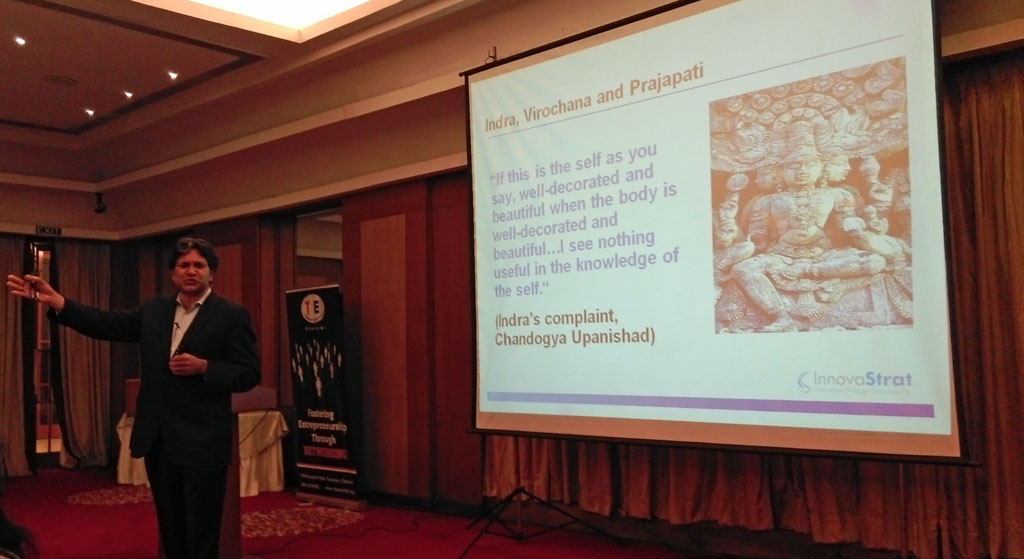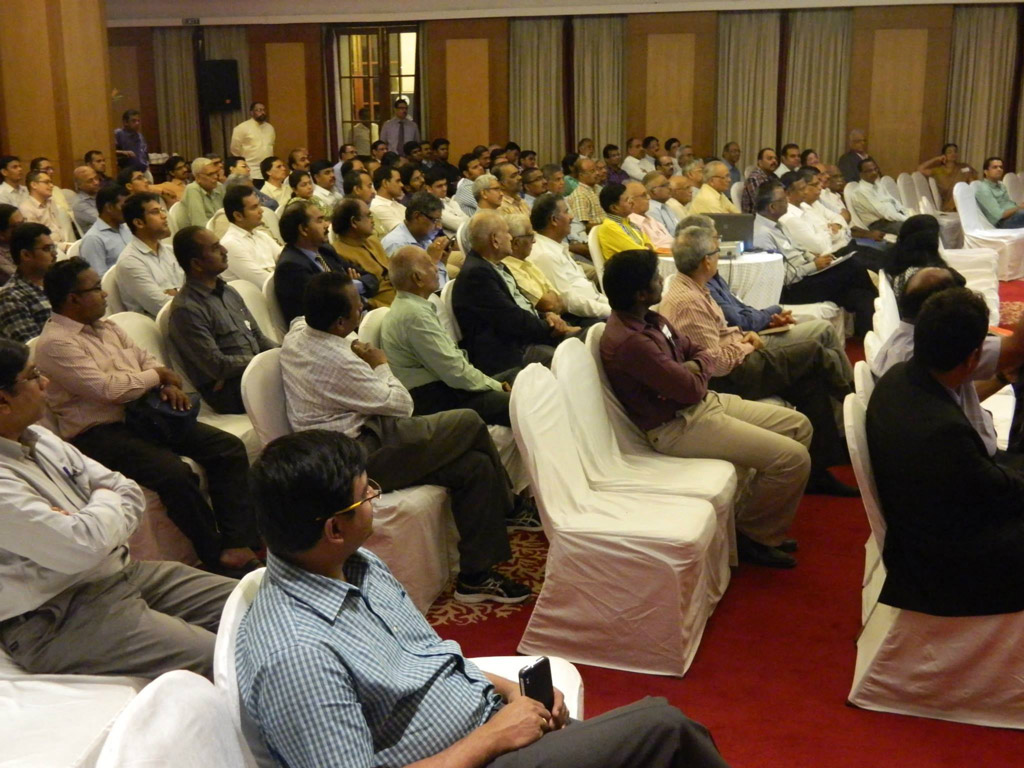Today TiE Chennai had organised a talk by Dr.Ram Nidumolu, HBR Author and Leadership Thought Leader. The talk was titled “Being-Centered Leadership and Business Transformation: How Ancient Indian Wisdom Can Drive the Future of Business”, certainly a mouthful. What caught my attention while I registered for it was the words “Ancient Indian Wisdom”, got me curious!
Dr.Ram didn’t keep us guessing, at the first slide itself he revealed that the Ancient Indian Wisdom he is going to talk comes from Indian Upanishads (collection of Sanskrit texts containing revealed Vedic truths). I like speakers who start with a story. Dr.Ram started with one from Chāndogya upanishad of Indra (King of Devas) and Virochana (Asura) going to Prajapati (lord of creatures) to learn about the true self. Both Indra and Virochana served Prajapati for 32 years, at the end Prajapati told them to see themselves naked in front of mirror, then to get dressed with exquisite dresses and ornaments, then see themselves again. Prajapati told them that what they saw now is true self, which Virochana misunderstood as truth. Indra approached again, served another 32 years, then another 32 years, after that another 5 years (total 101 years of tapas) before Prajapati revealed the secret, what is not destroyed/destroyable is true self – the atma.

Dr.Ram Nidumolu
Below are few points that I noted down and paraphrased from his talk.
Where business should be in 21st century?. The world of Business has changed significantly from the time of upanishad 2500 years. Today Inequality is increasing, refer the fine book “Capital” by Thomas Piketty. We need to relook at the way business is done, we need to look into the true-self (inner atma talked by Prajapati).
If you wish to put a value to see why business as usual doesn’t work. Look to this figure. The “Natural” capital (aka Natural resources) destroyed every year globally is $7.3 trillion, which is 13% of world economic output. It becomes that the era we are entering now is sustainable enterprise. We need to think on fifty year cycles of great trends. In that we need to see a business model that will sustain for not even hundreds of years, at least something that will sustain till say 2050. Sustainable business makes business sense also. Even that it’s not happening why?.
Many companies claim to take sustainable efforts, but in reality they mean CSR activities, even the great CSR activities are not fully sustainable. They are stuck in what I call stage 1 or 2 of sustainable enterprise. They are not able to mature to stage 3,4 or 5. How can you make “sustainable”, an integral part to your business. Be your (business) true self. You need to collaborate with other businesses, this is not a solo journey.
There is a new term coming around for this called “Natural capital management“. It tries to see this from the perspective, if we put an economic value to nature that will it change the behaviour of businesses. Even this, can it get senior management personal commitment, can it succeed in a conscious capitalism. But there are no real methods associated/replicable to all these terms. This is where I feel Upanishads can help.
The word Entrepreneur may even have its roots from the Indian word Anthar Prana, inside life-force. An Entrepreneur/Business needs the following to succeed in this journey:
- Business models
- Business processes
- Change in leaders mindset (inner inspiration)
it’s a combination of western management/repeatable practises and Indian wisdom, you need all the above three in your journey running a business. You (business) needs to change your sense of Inner self. Don’t over plan for future, Enjoy the path, the process, the present as told in Yoga/Meditation. This is what I explore in my book “Two Birds in a Tree: Timeless Indian Wisdom for Business Leaders“, where I talk about how two birds sitting in the same tree behave differently.
I have studied several businesses/leaders who followed this “Being-Centered” where Being is as in Human-Being (not a thing, not an object). One example is Paul Polman (CEO) of Unilever and another will be Dr. G. Venkataswamy (Dr.V) of Aravind Eye Hospital.
Dr.V. followed 3 principles in Aravind Eye Hospital:
- Never turn any one (better he can pay or not)
- Never compromise on quality (just because someone is being treated free doesn’t mean you can deliver substandard)
- Be completely self reliant (don’t borrow)
Dr.V. keeps saying to think of every patient who comes in, as your aunt or grand mother in your village.
Overall a different management talk that I got to hear in recent years, thanks for that to Dr.Ram. I have purchased his book (Two Birds in a Tree) from Amazon Kindle store for Rs.100, I will write about it once I have read it.

(left bottom) your’s truly listening attentively

